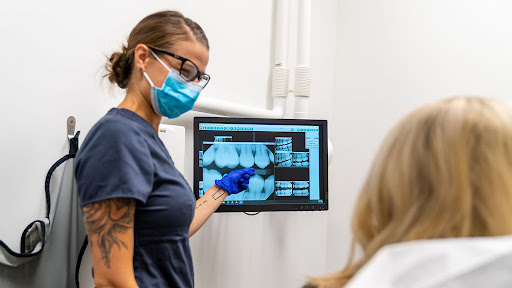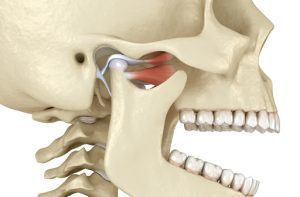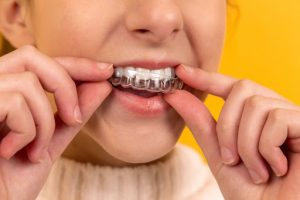
Saskatoon patients reporting increasing symptoms of jaw pain and TMD
What are you doing with your teeth right now? Are your upper and lower teeth touching right as you read this? If so, you might be clenching and grinding as an unconscious habit, or you may have tension in your jaw. Your temporomandibular joint (TMJ) is the joint that holds your jaw—the upper and lower teeth—together, making it possible to chew, speak, and yawn. If you experience TMD or any kind of TMJ discomfort or tension in the jaw, there will be implications for your dental health that you should know about.
What is TMD?
TMD refers to disorders characterized by inflammation or misalignment of the TMJ. It is often caused by or associated with clenching and grinding our teeth, which is a very common unconscious habit in our culture. It can be caused by stress, it can be hormonal, or it can be caused by other muscular misalignments in the head, neck or shoulders. The most common symptoms of TMD are:
- Temporomandibular joint pain
- Pain in the muscles of the face
- Headaches
- Wear and tear on your teeth
- Tooth sensitivity or pain
 How do TMJ problems affect my dental health?
How do TMJ problems affect my dental health?
Temporomandibular joint disorder has consequences for your teeth and oral health. Besides causing pain in the teeth and jaw joint, clenching and grinding related to TMD can cause wear on your teeth over time, thinning the protective enamel to leave your teeth sensitive and vulnerable to quicker decay or breakage. Patients with TMJ tension also often report tooth sensitivity and toothaches; two symptoms of potentially bigger unseen risks to your oral health. .
Are TMD and bruxism related?
TMJ disorders often result in misaligned chewing, malocclusion or occlusion, and teeth grinding. These are all common causes of tooth pain due to erosion and exposure of the sensitive inner dentin filled with nerve endings. Patients diagnosed with TMDs often experience bruxism as well, and patients who are clenching or grinding will often develop TMD. For more about bruxism, read Your teeth while you sleep: the dangers of bruxism.
If I have TMD, what can my dentist do?
Seeing your dentist regularly for annual checkups and cleanings is the best way to catch any potential problems before they become serious or costly. During your checkup, your dentist will be able to identify any early signs of damage caused by TMD and bruxism and recommend the best course of treatment. Depending on the severity of damage, they may suggest a few different treatment options.
Treatment for teeth damaged by TMD
The first step your dentist will recommend will be to address the physiological behavior that causes damage; practice becoming consciously aware that you are clenching and grinding, train yourself to notice when it is occurring and use strategies to stop or reduce the habit. They might suggest relaxation techniques to help relieve tension in the jaw, or they may suggest over-the-counter pain-relievers or anti-inflammatory medications. For developed cases, they can also refer you for physiotherapy, massage therapy, or chiropractic therapy to address underlying spinal or muscular imbalances associated with your case of TMD. If your pain continues after initial treatment efforts, your dentist may also refer you to a specialist in oral medicine or orofacial pain, an oral surgeon, an orthodontist, a periodontist or a prosthodontist.
Why do Saskatoon dentists recommend night guards for TMD?
Unfortunately, we don’t have conscious awareness or control over night time grinding, so we are unable to correct our habit as we can during waking hours. When we are sleeping, custom-fitted bruxism appliances will take stress off the muscles and jaw joint to reduce clenching and night grinding, as well as protect the teeth and any existing crowns or fillings from bruxism damage.. Read more about retainer appliances and our approach to bruxism protection
Regular TMD screening by your dentist during checkups is the best prevention
We always prefer to catch and treat any oral health problems early. We would rather fit you for a preventive night guard than perform invasive and costly major restorative work to repair damage caused by long term TMD and bruxism. If you have TMD or any kind of TMJ discomfort, your dentist can assess and help you mitigate the risk to your teeth before any real damage is done. Don’t miss your annual checkups!

 How do TMJ problems affect my dental health?
How do TMJ problems affect my dental health? 